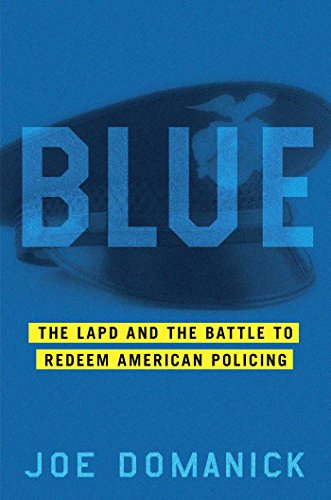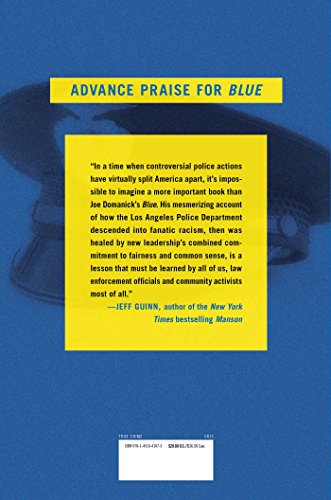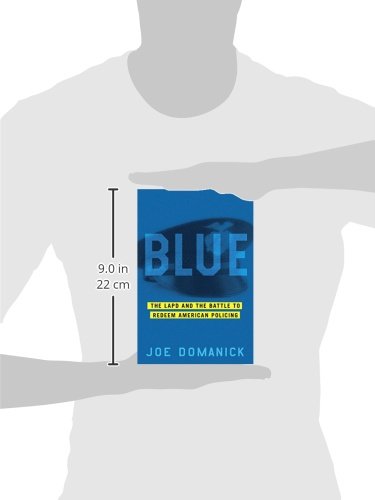Customer Services
Copyright © 2025 Desertcart Holdings Limited




Full description not available
P**Y
Loved the way this book was organized and how the stories flowed!
This is the first time I ever read anything from Mr. Domanick but it is obvious he is an experienced, professional writer… This is the first book I have read where some light was shed on the uneasy and somewhat strange relationship between the economically challenged segment of the African-American community and the hard working Korean immigrant community. It was also refreshing and interesting to read what a different - and common sense - approach Bratton took by focusing on prevention of crimes as opposed to fighting it… (I assume/hope there are periodic meetings or conventions of chiefs of police where “best practices” are shared and discussed….) – Overall, a thought provoking, extremely well researched and written book. Looking forward to reading other books of Mr. Domanick in the future!
B**C
but I was very disappointed with the content
Well written, but I was very disappointed with the content. Instead of being a historical account, it was a running op-ed commentary on the history of the LAPD and LA City. It was very biased. It highly exaggerated the role that the faults of the police played while understating the damage and devastation that gangs and gangsters did to their communities. Everything was blamed on racist police and that innocent gangsters were caught in a racist system. Not much at all about personal or societal accountability to actions of people who committed crimes. The author brought in and furthered the narrative that Michael Brown was an innocent target of a racist and violent white cop, even though the indecent was reviewed by several independent teams of investigators and the officer was not indicted. It was a cheap shot used by the author to further and reinforce his position.There were some interesting nuggets of information regarding the some of the city leaders and their personalities.
A**R
My favorite book of the year was Ghettoside
My favorite book of the year was Ghettoside: A True Story of Murder in America by Jill Leovy. Both are about policing in LA. Blue gives the historical perspective and Gettoside dives into the day-to-day policing on the ground and the cultural/historical perspective of police-Afro American relationships from the deep south, especially Mississippi and Louisiana where many of LAs blacks migrated from. I believe Blue's strongest contribution is how the relationship of the LA mayors and the police commissioners played an integral role leading up to Watts in 1964 and the Rodney King riots in 1992. These relationships and the strengths/weaknesses of the mayors and commissioners also drives the key story line of the book - The Battle to Redeem American Policing. While this story focuses on LA, Bill Bratton, and his philosophy on policing the discussion is relevant to policing across the nation. Bratton was police commissioner in New York City, and Boston before moving to LA in 2002, was instrumental in advancing COMSTAT, stop and frisk, and broken windows theories during his career. (Bratton is again Police Chief in NYC) While Bratton was widely lauded in the '90s thought the first decade of the 21st century, there is more scrutiny and questioning of side-effects of these methods - especially since Ferguson. I highly recommend both book for a perspective you will not find by reading the headlines, watching TV, or from the opinions of a few columnists or pundits.
E**O
LAPD: a view at the top.
A political history of LAPD and L.A. itself from Chief Parker to yesterday. Well-written, opinionated, and easy-to-read.Domanick has followed the LAPD for years and brings new insights to the continuing failure of LAPD to connect with thosecitizens who most need its protection. Very interesting analysis of the qualities of the various Chiefs, and how they played intothe politics of the times.
M**K
Makes the case for community control of police
Despite the Serpico scandal that roiled the New York Police Department in the 1970s, despite all the tales about corruption in the Chicago Police and the low esteem in which all police have been held in the public mind for much of U.S. history, it’s likely that no police department in any large American city so richly deserved its reputation as brutal and corrupt as did the Los Angeles Police Department from the 1940s until the early years of the twenty-first century. This, after all, was the agency that provoked the horrific 1992 riots following the acquittal of four white police officers in the sadistic beating of Rodney King.In Blue, investigative reporter Joe Domanick focuses on the years following the 1992 riots as the city struggled to reform its police. As he so ably demonstrates, the police — from the rank and file all the way up through the command structure to the office of the chief — successfully resisted those efforts for a decade. Efforts by politicians and other outsiders were ineffectual, because in reality the police were left to police themselves. And that appears to have been the nub of the problem.Only with the advent of the consent decree imposed on the city by a liberal federal judge, and the hiring of former New York Police Commissioner Bill Bratton as the new chief, did the advocates of reform finally gain traction. Now, more than a decade later, the most egregious abuses perpetrated by the department on the people of Los Angeles — most prominently, its black and brown people — are far less common. Domanick implies that police corruption is no longer endemic, there are far fewer murders and far less violent crime overall, and in most of the city the police are no longer viewed as a predatory occupying army. However, as he makes clear, the poverty, racism, and institutional inertia that were the ultimate causes of most of the abuse have by no means been eliminated.In Domanick’s view, the heroes of the story are Bratton and his hand-picked successor as chief, Charlie Beck; the Los Angeles Times reporters and editors who published more than 150 stories to highlight the notorious practices of the LAPD’s Rampart Division, which finally forced the department’s criminal misbehavior into the public’s awareness; the resourceful police captains and deputy chiefs nurtured and promoted by Bratton and Beck who engaged the community and reoriented the officers under their watch; Gary Alan Feess, the federal district judge who handed down and later renewed the consent decree; a reformer named Connie Rice, who spearheaded efforts to combat gang violence in a comprehensive way instead of answering violence with violence; and the grassroots gang interventionists, mostly former gang-bangers, trained by Rice and supported by the chief. Antonio Villaraigosa, Mayor of Los Angeles from 2005 to 2013, played a key role as a supporting actor in the drama, along with a handful of brilliant outsiders brought to L.A. by Bratton and slotted into strategic positions to revitalize the department.Undoubtedly, the decades-long effort to reform the LAPD was successful, but only up to a point. In an epilogue, Domanick reflects on Bratton’s legacy and concludes that it is mixed: brilliant, but badly marred by the stop-and-frisk tactic that was central to the “broken windows” strategy he had first championed in New York . Tellingly, now that Bratton has returned as Commissioner of the NYPD under Mayor Bill de Blasio, he has cut back dramatically because it had come to be so badly overused.Blue helps throw light on the current debates about police conduct throughout the country. The book makes an important contribution. However, the publisher, Simon & Schuster, and the book’s editors, Karyn Marcus and Emily Graff, did a disservice to the author — and to all his readers — by failing to missing words and other editorial flaws scattered throughout the book. It’s a sad day when such a prestigious publisher should bring out a book filled with bonehead editorial mistakes. Where were the copyeditor and the proofreader when we needed them?Joe Domanick is an award-winning investigative reporter, Associate Director of the Center of Media, Crime, and Justice of the John Jay College of Criminal Justice, and West Coast Bureau Chief of The Crime Report. He has been reporting on the LAPD for several decades.
M**P
Very well done
It explains how our society had changed. A very honest look at American Policing. He does not sugar coat the problems we face
J**E
Fascinating
This is a fascinating and sadly still relevant book about the recent history of policing in LA and, to a lesser extent, New York, and the way in which institutional racism is incredibly difficult to tackle even when there’s a will to do so. Its also really interesting on the qualities of leadership - the kinds that work and the kinds that don’t. It’s a shame that it’s a really shoddily edited book, full of typos and misspellings (the same person’s name spelt in two different ways on the same page, in one instance) - the author deserves better.
Trustpilot
2 days ago
2 months ago